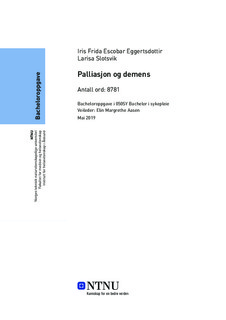| dc.contributor.advisor | Aasen, Elin Margrethe | |
| dc.contributor.author | Eggertsdottir E, Iris Frida | |
| dc.contributor.author | | |
| dc.contributor.author | Slotsvik, Larisa | |
| dc.date.accessioned | 2019-09-06T14:10:54Z | |
| dc.date.available | 2019-09-06T14:10:54Z | |
| dc.date.issued | 2019 | |
| dc.identifier.uri | http://hdl.handle.net/11250/2613525 | |
| dc.description.abstract | Hensikt: Oppgaven har til hensikt å belyse hvordan sykepleiere erfarer å gi palliativ pleie til pasienter med langtkommen demens. Dette for å oppnå økt kunnskap om hvordan sykepleiere kan gi best mulig pleie til en økt voksende og sårbar gruppe.
Metode: Systematisk litteraturstudie.
Resultat: Å møte personer med langtkommen demens i palliativ fase er en utfordring for sykepleiere. Sykepleiere sine erfaringer er at de mangler kunnskap om både demens og palliasjon. Godt samarbeid mellom lege og sykepleier er av stor betydning. Kontinuitet i helsehjelpen er avgjørende for sykepleiere, god palliativ omsorg krever at sykepleiere kjenner godt pasienten. Sykepleiere erfarer palliative plan som et nyttig verktøy.
Konklusjon: Manglende kunnskap om palliativ omsorg og demens kan være en hinder for sykepleiere når de skal utøve palliativ pleie. Tverrprofesjonelt samarbeid med lege er avgjørende for å oppnå best mulig resultat. Pårørende til pasienter med langtkommen demens er en viktig ressurs og sykepleiere må tørre å prate om ubehagelige tema. Bruk av palliativ plan sikrer samhandling, planlegging og tilrettelegging av tiltak slik at den som er syk og familien kan oppleve trygghet. | |
| dc.description.abstract | Aim: The purpose of the assignment is to elucidate how nurses experience providing palliative care for patients with advanced dementia. This is to achieve increased knowledge about how nurses can provide the best care to this vulnerable group.
Method: Systematic literature study.
Result: Meeting people with dementia in the palliative phase is a challenge. Nurses' experiences are that they lack knowledge of both dementia and palliative. They find that there is little provision for further education or courses within the topics. Cross-professional collaboration is essential. Poor collaboration with a doctor is a great burden for the nurse, patient and relatives. Nurses feel that supporting the family of a patient is one of the most important nursing tasks. Continuity in health care is crucial. Good palliative care requires nurses to know the patient well. Good planning in the form of palliative planes is important in order to avoid unnecessary admissions and invasive treatments.
Conclusion: Lack of knowledge about palliative care and dementia can be a hindrance to nurses when practicing palliative care. Interprofessional collaboration is crucial to achieving the best possible result. A well-prepared palliative plan can contribute to increased quality of life and well-being of the patient and relatives. | |
| dc.language | nob | |
| dc.publisher | NTNU | |
| dc.title | Palliasjon og demens | |
| dc.type | Bachelor thesis | |
